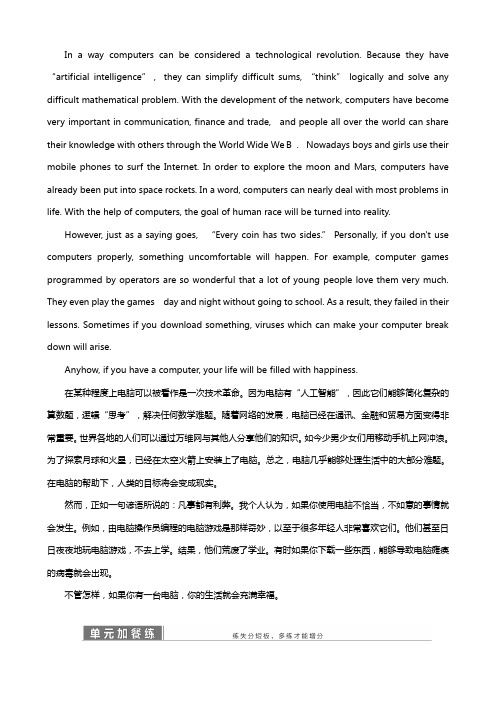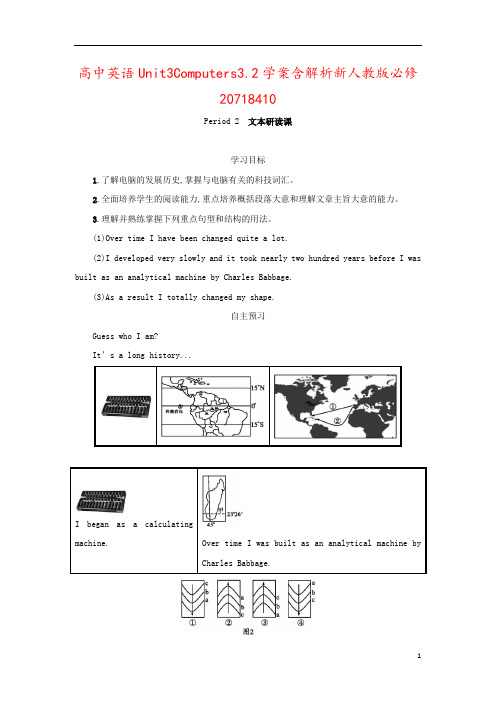高中英语 31 Computers 新人教版必修
- 格式:pptx
- 大小:1.75 MB
- 文档页数:85





In a way computers can be considered a technological revolution. Because they have “artificial intelligence”,they can simplify difficult sums, “think” logically and solve any difficult mathematical problem. With the development of the network, computers have become very important in communication, finance and trade, and people all over the world can share their knowledge with others through the World Wide WeB.Nowadays boys and girls use their mobile phones to surf the Internet. In order to explore the moon and Mars, computers have already been put into space rockets. In a word, computers can nearly deal with most problems in life. With the help of computers, the goal of human race will be turned into reality.However, just as a saying goes, “Every coin has two sides.” Personally, if you don't use computers properly, something uncomfortable will happen. For example, computer games programmed by operators are so wonderful that a lot of young people love them very much. They even play the games day and night without going to school. As a result, they failed in their lessons. Sometimes if you download something, viruses which can make your computer break down will arise.Anyhow, if you have a computer, your life will be filled with happiness.在某种程度上电脑可以被看作是一次技术革命。

高中英语Unit3Computers3.2学案含解析新人教版必修20718410Period 2文本研读课学习目标1.了解电脑的发展历史,掌握与电脑有关的科技词汇。
2.全面培养学生的阅读能力,重点培养概括段落大意和理解文章主旨大意的能力。
3.理解并熟练掌握下列重点句型和结构的用法。
(1)Over time I have been changed quite a lot.(2)I developed very slowly and it took nearly two hundred years before I was built as an analytical machine by Charles Babbage.(3)As a result I totally changed my shape.自主预习Guess who I am?It’s a long history...I began as a calculatingmachine. Over time I was built as an analytical machine byCharles Babbage.From then on,I grew rapidly both in size and in brainpower.As time went by,I was made smaller.First as a PC.Then as a laptop.As a result my memory became so large that even I couldn’t believe it!I am a computer!思考导引As we can see from the pictures,computers have developed fast lately,so are you interested in exploring more detailed information?课堂探究Step 1 Reading1.SkimmingA.Read the text quickly and try to find out the topic sentence for each paragraph.Matching work:2.ScanningDraw the timeline(时光轴)and find the relevant(相关的)events.The computer began as a calculating machine.1822 .1936 .The computer has grown as large as a room.1960s .1970s Computers were used in offices and homes.Now .3.Careful readingA.Read through the text carefully and then fill in the blanks(1).After two hundred years he wasmachine by Charles Babbage.He(5)(6)intelligence.By the 1940s he grew as large as aworried his designers.As time(9)timeeven hehimself couldn’t believe it!Since the 1970s manyhave been found for him.He has eventheis toB.Read the text again and then do the true or false exercises.1.In 1642 I began as a calculating machine and could solve any mathematical problem.( )2.My real father was Charles Babbage,who wrote a book and built me in 1936.( )3.After I got my new transistors in the 1960s,I became smaller but cleverer and quicker.( )4.I was brought into people’s homes in the 1970s.()5.Since my birth I have been built to take the place of human race.( )Step 2 Cracking the hard pointsObserve the sentences carefully and translate them into Chinese.1.Over time I have been changed quite a lot.2.As a result I totally changed my shape.3.I developed very slowly and it took nearly two hundred years before I was built as an analytical machine by Charles Babbage.4.After all,with the help of my electronic brain which never forgets anything,using my intelligence is what I’m all about.5.This means that it should clean the house,mop the floors,cook the dinner and deal with telephone calls.Step 3.ConsolidationRead the text carefully again and complete the following charts.8.Step 4.Post-readingHave a debate:Computers have good effects on our life.You may begin by...1.Great changes have taken place since computers came into people’s life...2.Over time...3.By using computers,we deal with...4.We can’t live without...5.I don’t agree...6.We still...with the help of...7.As a result,it...puters have brought...9.so...that...10.I don’t think there is anything in common...Some useful words,phrases and sentence patternsanyhow,from then on,totally,however, in a way,personally,over time in my opinion,what’s more,what’s worse,in addition,all in all 课后提升1.And my memory became so large that even I couldn’t believe it!我的存储容量变得如此之大,连我自己也不能相信!so...that such...that 如此……以至于,引导结果状语从句,so后跟形容词或副词,such 后跟名词。
Unit 3 ComputersI 教学内容分析本单元的中心话题是“计算机”。
Warming up部分用图片呈现了计算机发展的历史,让学生通过看图讨论的方式了解计算机的发展和演变过程。
Reading部分编者采用了拟人化的手法向读者介绍了计算机的发展历程。
Comprehending部分包括三个练习,分别从事实层面、分析层面和拓展层面考察学生对文章的理解和运用情况。
Learning about language部分的活动突出了形容词和副词用法的区别,并扣本单元的语法点(现在完成时的被动语态)。
Using language部分的听力材料中谈论的是信息技术的几种形态或载体(包括收音机、书籍、电视和电脑;在读说活动中,通过智能机器人参加足球赛的经历向读者介绍了计算机运用的另外一个例子。
Learning Tip部分鼓励学生利用图书馆,网络等课外资源学习英语,有利于学生使用资源策略。
Reading for Fun 部分是一首活泼风趣的小诗,以拟人的方法让机器人自述了心声:尽管日夜忙碌,为人服务,但它相信自己和真实的人类没什么两样。
II.教学重点和难点1.教学重点(1) 本单元的生词和短语;(2)通过学习本单元,使学生了解计算机的发展历程,及其在当今社会的广泛运用;(3)鼓励学生用英语表达自己的观点,进行简单的推理和做出决定。
2.教学难点(1) 教会学生通过时间的先后顺序来表达一件事;(2) 使学生了和掌握现在完成时的被动语态的用法;(3) 指导学生按类别归纳整理词汇,让学生学会有效地记忆词汇的方法;(4) 引导学生发现本单元重点语言结构,让学生自己发现并感悟相关的语言规律,在学习过程中培养语感。
III.教学计划本单元分六课时:第一课时:Warming Up, Pre-reading, Reading第二课时:Language points第三课时:Learning about language第五课时:Speaking, Reading, WritingIV.教学步骤:Period 1 Warming Up, Pre-reading, ReadingTeaching Goals:1. To know something about computers.2. To learn and talk about computers.Teaching Procedures:Step 1. Leading-inPurpose: To activate the Ss and arouse them to talk about the importance of computers in modern society.Ask Ss whether they have a computer or not and what they use it for. Let them talk as much as possible.Step 2. Warming UpPurpose: To get Ss to think about the differe nt ways computers can be made.Pair workGet Ss to look at the following pictures, and then ask them to answer the questions.A huge computer A PCA notebook computer A calculatorAn abacus1. What are they?2. What do they have in common?3. What is a computer?Suggested Answers:1. a huge computer, a personal computer, a notebook computer, a calculator, an abacus2.(1) to be used to calculate;(2) operate by human beings;(3) they are all artificial;(4) show figures in a certain way.3. A computer is a machine which stores knowledge in its memory and does calculations onthat knowledge. This knowledge is stored in symbols; it is called data. A computer usually has a monitor to show results. However, some computers can speak; these computers can be used for voice mail.A computer is now almost always an electronic device. It usually contains materials whichare toxic; these materials will become toxic waste when disposed of. When a new computer is purchased in some places, laws require that the cost of its waste management must also be paid for. This is called product stewardship.Step 3. Pre-readingPurpose: To activate Ss’ interest about computers.Group workAsk Ss the following questions and encourage them to say more.1.How have computers changed our lives ?2.What do you know about computers ?Suggested Answers:1. They’re a much more useful and humane tool than the phone , and with corporate America behind them the networks will be everywhere--- changing our lives more than any technology since the automobile.2. A multi-function electronic device that can execute instructions to perform a task.A device that accepts information, processes it, and supplies an output. A computer usually contains memory, a control unit, arithmetic and logical units, and a means for input and output.A programmable hardware component that is controlled by internally stored programs and that can perform substantial computations (including arithmetic and logic operations) without human intervention. A computer typically consists of one or more processing units, memory units, and associated peripheral input and output devices.Step 4. Reading1. SkimmingPurpose: 1. To get a brief understanding of the text.2. To train the students’ listening ability.First, let Ss skim the text and then listen to the recording of the text. Pay attention to the pauses and pronunciation.2. ScanningPurpose: To get Ss to have some details in the text.Now we are to read the text again and underline all the expressions in the text. Writethem down in your notebook.3. Further ReadingPurpose: To get Ss to get more details about the text.Read the text again and find the information to complete the table, which describes thedevelopment of computer.1642: ___________________________________________________1822: The Analytical Machine was made by Charles Babbage.____: ___________________________________________________1940s: ________________________________________________________: The first family of computers was connected to each other.1970s: ___________________________________________________Now: ___________________________________________________Step 5. RetellPurpose: To have a deep understanding of the text.Ask Ss to use the chart above to retell the development of the computer.One possible version:I, a computer, was a calculating machine in 1642 in France. Then I was built as an Analytical Machine in 1822, which was a technological revolution. I became a “universal machine” in 1936 to solve any mathematical problem. I was not very big at first then I became huge, the size of a large room before I was made smaller and smaller.Getting new transistors, later very small chips I changed my shape. I was connected with other computers and turned out to part of a network in the early 1960s. In 1970s I was brought into people’s homes, and came the Internet.Step 6. Homework1. Write a short passage about the development of computers.2. Finish Ex1 (P19), Ex2 (P20).Period 2 Language pointsStep 1 Word studyGroup workDivide Ss into four groups and ask them to discuss the following words.1. common(1)most widely known; ordinary:Eg He is a common sailor.(2)have nothing/little/something/ a lot in commonEg At first, I think we only had one thing in common, but suddenly I felt we had a lotin common.Eg The two brothers had everything in common in their manners, but the two sisters have little in common.Eg They have nothing in common with one another.2. analytical分析的Eg The scientist analyzed the milk and found it contained too much water.3.technology 科技;技术Eg With the development of technology, we will cure AIDS sooner or later.4.calculate(v.)1)to use numbers to find out a total amount, distance, etc. 计算;核算We haven’t really calculated the cost of the vacation yet.2)to guess sth by using all the information available 推测,估计It is impossible to calculate what influence he had on her life.5.As time went by, I was made smaller.随着时间的推移,我被弄得越来越小。